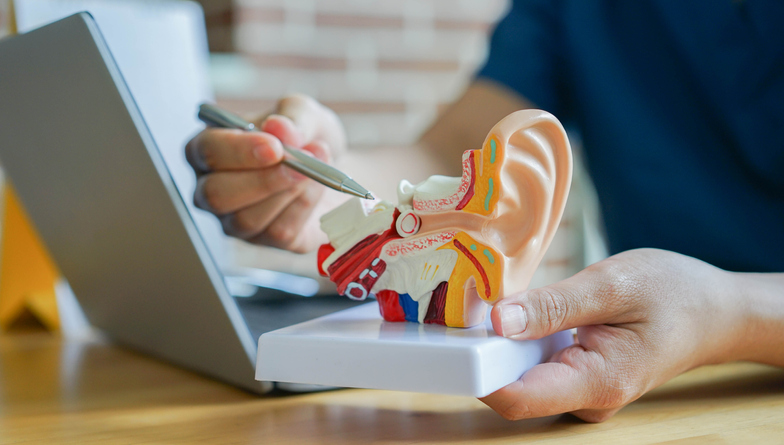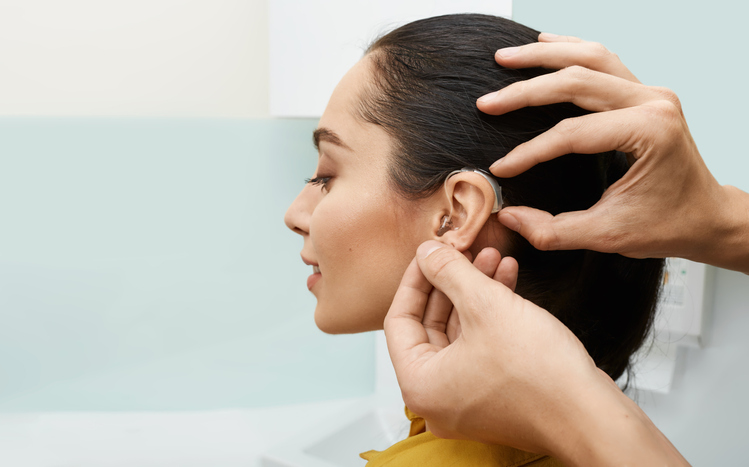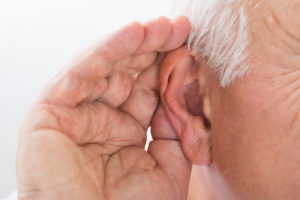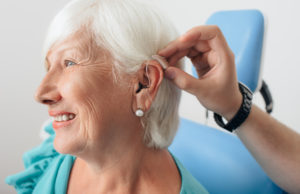Hearing loss is fairly common and increases in probability as we age. It is most commonly caused by damage to the inner ear or nerves of the inner ear. Other common causes of hearing loss include injury, a congenital defect, exposure to loud noise, disease, certain medications, or age-related wear and tear. Some might not have complete loss of hearing, but rather difficulty hearing, and strained hearing. There are solutions, as well as hearing loss treatment, to help you hear better, including hearing aid devices, and coaching on lip-reading if necessary. However, the first step is to get examined by a doctor. Dr. Madison Richardson is a skilled and experienced Otolaryngology. Get treatment for hearing loss at our Beverly Hills doctor’s office by Dr. Madsion Richardson, contact us and schedule your appointment today!

Symptoms of hearing loss
The symptom or signs to look out for that indicate hearing loss are:
- Difficulty hearing consonants
- Sound and speech muffled
- Needing to increase volume often
- Having a hard time understanding words and distinguishing them in a crowd or background noise
- Having to ask people to speak more clearly, slower, and louder
- Avoiding socializing
- Removing yourself from conversations
Hearing loss causes
It is easier to understand your hearing loss diagnosis if you understand your ears a little better.
How we hear sounds
The ear is made up of three different areas which include the inner ear, the middle ear, and the outer ear. The sound occurring around us moves in waves through the outer ear, causing vibrations on the ear drum. This eardrum, accompanied by three small bones in the middle ear work to boost these vibrations while they make their way to the inner ear. Once in the inner ear, these vibrations move through the fluid that is in a structure of the inner ear known as the cochlea which is shaped like a snail. There are thousands of very small hairs attached to the nerve cells located inside of this cochlea that assist your brain in translating the vibrations of sound to signals that are then transmitted to your brain to process.
Ways that you may lose hearing
These are the main causes of hearing loss:
- Damage to the inner ear. Exposure to loud noise will cause wear and tear to the hairs in the cochlea responsible for transmitting signals. If the nerve cells are damaged or no longer there (or the hairs), the signals cannot be transmitted, and you lose your hearing.
When this starts to happen, tones that are high-pitched become hard to hear, and distinguishing words from other noises is also very difficult. - Gradual buildup of earwax. If earwac is blocking the ear canal, this prevents sound waves from traveling to the cochlea. Earwax removal may be necessary to hear again.
- Ear infection and abnormal bone growths or tumors. Any of these developments can affect your hearing, or cause complete hearing loss.
- Ruptured eardrum (tympanic membrane perforation). A Sudden blast of sound, pressure changes and poking of your eardrum can rupture your eardrum, damaging your hearing.
Risk factors for hearing loss
Instances that cause the loss of or damage to the hairs and nerve cells are:
- Aging. Over time, your inner ear structures begin to age and break down.
- Loud noise. Being exposed to loud sounds can be damaging to your inner ear, and even a sudden one-time loud noise can cause this damage.
- Heredity. Certain genetic profiles can make a person more likely to develop inner ear problems and hearing loss.
- Occupational noises. If loud noise is a regular occurrence at your job, this could lead to damage to your inner ear and hearing functions.
- Recreational noises. Being exposed to explosive sounds, like engines and firearms, has the ability to cause instant, permanent loss of your hearing. Other recreational risk factors are loud music, carpentry tools, motorcycling, and snowmobiling.
- Some illnesses. Certain diseases or viruses that cause a high fever, like meningitis, have the possibility to damage the cochlea and cause hearing loss.
Preventing hearing loss
There are some things you can do to help prevent hearing loss from loud noises, and avoid increasing age-related loss, including:
- Protect your ears. Decreasing the amount of time, and the sound level of noise is the number one protection method. If you work in a loud environment, wearing earmuffs lined with glycerin can help to protect your ears from damage.
- Have your hearing tested. You should contact Dr. Richardson for routine hearing tests if you are working in a loud environment. If hearing loss has begun, there are preventive measures the doctor can put in place for you.
- Avoid recreational risks. Over time, activities that cause very loud noises will damage you’re hearing. If possible, wear protective gear, or limit your exposure to loud sounds from machinery, power tools, sports vehicles, and loud music.
When to contact Dr. Richardson
If your loss of hearing is sudden, especially in one ear, you should contact Dr. Madison Richardson immediately.
You should also mention in your appointment if you’re hearing difficulties are having a large impact on your day-to-day life. If you’re hearing loss is correlated to aging, it is a gradual change, which you may or may not be aware of happening.
book an appointment



